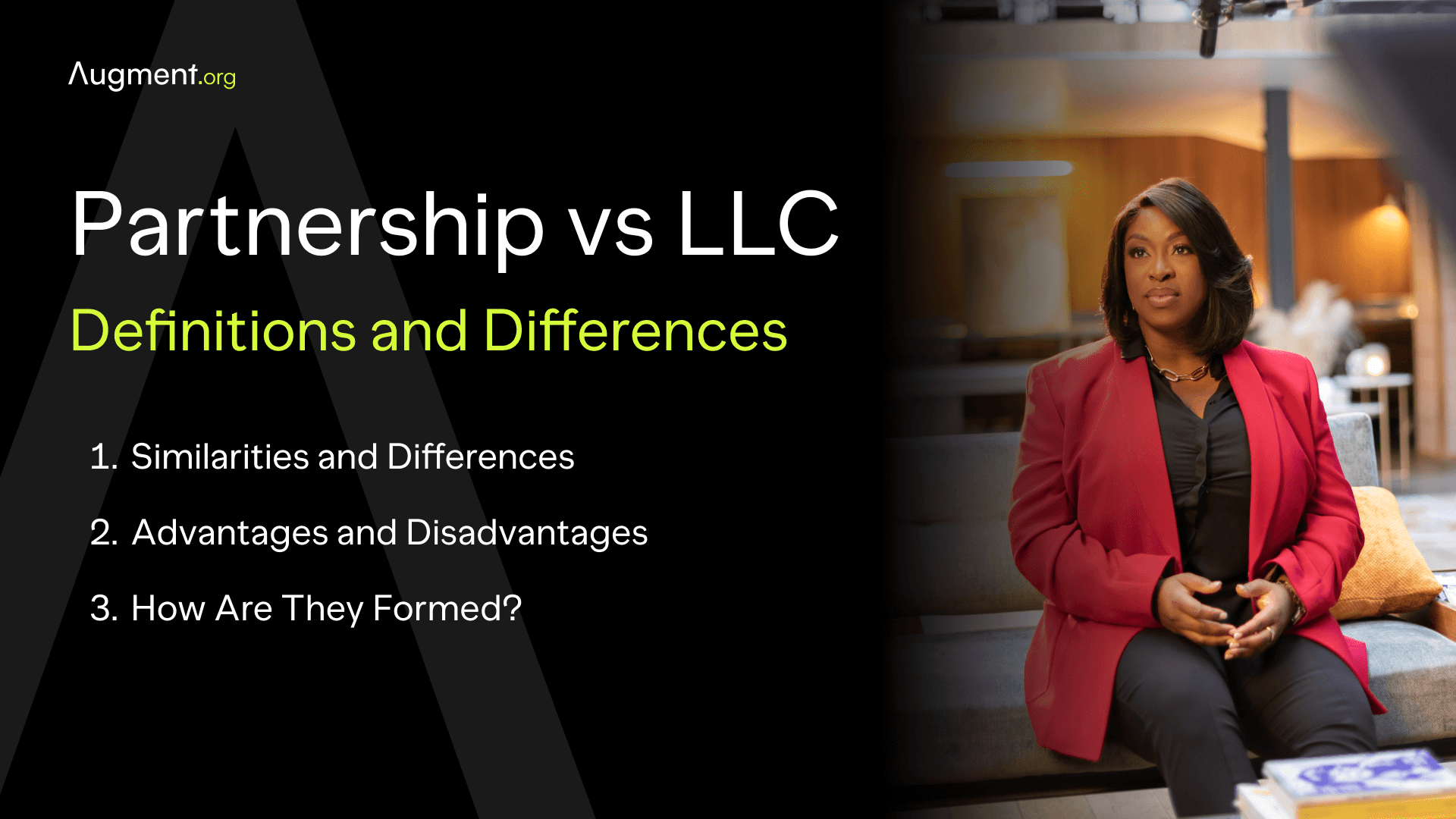Partnership vs LLC: Definitions and Differences
Comparing LLC and partnership structures helps entrepreneurs choose wisely. Explore key differences in liability protection, management flexibility, and tax implications to find the best fit for your business goals and risk tolerance.

What is a Partnership?
A partnership is a business structure where two or more people co-own and operate a business. In this setup, partners share in the business's profits and losses, and their personal assets can be affected by the business's debts. The partnership is an appealing structure for many due to its simplicity and flexibility.
There are several types of partnerships. A general partnership involves all partners equally participating in the day-to-day management and being personally responsible for business debts. This means each partner's personal assets are potentially at risk if the business faces liabilities.
Limited partnerships include both general and limited partners. The limited partners contribute capital but do not take part in managing the business, which limits their personal liability. They are not personally liable beyond their investment in the business.
A written partnership agreement is not mandatory but highly recommended. This agreement outlines how profits, losses, and management duties are shared among partners. It's a key document that can prevent disputes and provide clarity in operations.
Partnerships don't pay income tax as a separate legal business entity. Instead, profits and losses are passed through to the partners' personal tax returns, a structure known as pass-through taxation.
Partnerships offer a simple and flexible business structure with various options, but they come with personal liability risks for the business partners.
What is an LLC?
A Limited Liability Company (LLC) is a popular business structure that blends elements of partnerships and corporations. It's favored by many for its flexibility in management and operations, as well as the liability protection it offers.
The key feature of an LLC is limited liability. This means LLC owners, often called members, are not personally liable for the company's debts and liabilities. In other words, their personal assets are protected in case the business incurs debt or is sued. This is a major difference from partnerships where business partners can be personally responsible for business debts.
An LLC can have one or multiple owners. These owners manage the business, or they can choose to appoint managers for this purpose. This flexibility allows LLCs to operate in a way that best suits their business needs.
Regarding taxes, LLCs enjoy pass-through taxation. Profits and losses of the business pass directly to the owners' personal tax returns, avoiding the double taxation that corporations face. This makes LLCs an efficient option for tax purposes.
An LLC is formalized through an operating agreement and filing formation documents with the state. The operating agreement lays out the structure of the LLC, including the roles of members, profit distribution, and the process for adding or removing members.
In summary, an LLC offers a flexible business structure with the added benefit of limited personal liability for its members, making it an attractive option for many business owners.
How are a Partnership and an LLC Similar?
Although partnerships and limited liability companies (LLCs) have distinct features, they share several similarities crucial for business owners to understand.
- Pass-Through Taxation: Both partnerships and LLCs typically benefit from pass-through taxation. This means the business itself isn't taxed directly. Instead, profits and losses are reported on the personal tax returns of the owners or partners, which can simplify tax filing and avoid the double taxation often seen in corporations.
- Formation Flexibility: Both business structures offer flexibility in terms of formation and operation. This flexibility can be appealing to business owners who prefer a less rigid structure compared to corporations. They allow for multiple owners (partners in partnerships and members in LLCs) and can be relatively straightforward to set up.
- Management and Ownership: Both partnerships and LLCs provide a degree of flexibility in management. In a partnership, partners collectively manage the business unless stipulated otherwise in a partnership agreement. In an LLC, members can manage the business, or they can elect to have managers (who can be members or outsiders) handle the day-to-day operations.
- Business Entities: Both are considered separate legal entities from their owners. This separation allows for the business to enter into contracts, acquire assets, and conduct business under its name.
- Operating Agreement Importance: For both structures, having a well-drafted operating agreement or partnership agreement is important. These documents outline the operational procedures, profit sharing, management responsibilities, and steps for resolving disputes. They are crucial for the smooth functioning of the business.
How are they Different?
While partnerships and LLCs (Limited Liability Companies) share similarities, they have distinct differences that can significantly impact a business owner's decision.
- Liability Protection: One of the primary differences is in liability protection. In a general partnership, partners are personally liable for business debts and legal actions against the business. This means personal assets like homes and savings are at risk. LLCs offer limited liability protection, where members are generally not personally liable for business debts, safeguarding their personal assets.
- Ownership and Investment: In partnerships, each partner's stake in the business is typically tied to their investment or contribution. LLCs offer more flexibility in structuring ownership and distributing profits. Members can have different levels of investment and still share profits and losses in a manner outlined in the LLC's operating agreement.
- Taxation Options: While both entities generally benefit from pass-through taxation, LLCs have more options. An LLC can choose to be taxed as a sole proprietorship, partnership, or corporation (S corporation or C corporation), providing more control over how taxes are handled.
- Legal Formalities: Setting up an LLC often involves more legal formalities than forming a partnership. LLCs require filing formation documents with the state and often have annual reporting requirements. Partnerships, especially general partnerships, can be formed with fewer formalities and may not require state registration.
- Management Structure: In a general partnership, management duties are shared equally among partners unless otherwise agreed upon. LLCs offer more flexibility, allowing members to manage or appoint managers who can be members or outsiders.
- Continuity of Existence: LLCs typically have a more enduring existence. When a member leaves an LLC, it can continue operating. In contrast, partnerships may need to be dissolved or reformed if a partner exits, depending on the terms of the partnership agreement.
Advantages of a Partnership
Partnerships are a popular choice for many business owners due to several distinct advantages:
- Simplicity in Formation: One of the biggest advantages of a partnership is its ease of formation. Unlike other business entities, partnerships can be formed with minimal paperwork and legal formalities. This simplicity makes it an attractive option for many new business owners.
- Flexibility in Management: Partnerships offer significant management flexibility. Partners can directly manage the business and make decisions without the need for formal processes or bureaucracy, allowing for quick adaptation to changes and direct control over business operations.
- Direct Profit Sharing: In a partnership, profits and losses flow directly to the partners, who report them on their personal tax returns. This pass-through taxation means that profits are only taxed once, avoiding the double taxation common in corporations.
- Combined Skills and Resources: Partnerships allow individuals to pool their resources, skills, and expertise. This collaboration can lead to better decision-making, more innovation, and increased efficiency in managing the business.
- Fewer Regulations: Generally, partnerships face fewer regulations than corporations or limited liability companies (LLCs). This lesser regulatory burden can result in lower operating costs and less compliance-related paperwork.
- Personalized Service: Especially in professional fields like law or accounting, partnerships often offer a more personalized approach to service. Clients may prefer working with a specific partner, adding a personal touch that can be advantageous in service-oriented industries.
- Shared Responsibility: Running a business can be challenging, and having partners can mean shared responsibility for business debts and operations. While this can be a double-edged sword, it also means that the burden of decision-making and management doesn't fall on a single individual.
Disadvantages of a Partnership
While partnerships offer several benefits, there are also notable disadvantages to consider:
- Personal Liability: One of the most significant drawbacks of a general partnership is the personal liability of the partners. Each partner is personally liable for the debts and obligations of the business, potentially putting their personal assets at risk.
- Limited Life Span: Partnerships often face stability issues. If a partner leaves, retires, or passes away, the partnership may need to be dissolved or reformed. This can lead to uncertainty and a lack of continuity in business operations.
- Conflict Potential: With multiple owners, there's always a potential for conflicts. Differences in management style, business vision, and decision-making can lead to disagreements among partners, potentially hindering the business's progress.
- Profit Sharing: Profits in a partnership are shared among the partners. This means that even if one partner contributes more in terms of effort or resources, profits are still split according to the partnership agreement, which may not always seem equitable.
- Decision-Making Delays: In a partnership, decisions often require consensus among all partners. This need for agreement can slow down decision-making processes, especially in crucial situations where quick action is needed.
- Limited Capital: Raising capital can be more challenging for partnerships compared to corporations or LLCs. Partners typically have to contribute their own funds or secure loans, which might limit the business's growth potential.
- Less Attractive to Potential Employees: Partnerships may not be as attractive to potential employees or partners as other business structures, especially when it comes to offering stock options or other equity incentives.
Advantages of an LLC
Limited Liability Companies (LLCs) have gained popularity as a business structure, offering several advantages:
- Limited Personal Liability: One of the most significant benefits of an LLC is the limited personal liability for its members. Unlike partnerships, where individual assets might be at risk, LLC members are typically not personally liable for business debts and liabilities. This protection is a key differentiator from other business structures.
- Tax Flexibility: LLCs enjoy considerable tax flexibility. They can choose to be taxed as a sole proprietorship, partnership, or corporation (S corporation or C corporation), allowing for strategic financial planning. This flexibility, especially the pass-through taxation option, avoids double taxation and can lead to significant tax savings.
- Operational Flexibility: LLCs offer more flexibility in how they are run compared to corporations. They don't require a board of directors, shareholder meetings, or other formalities, allowing members to structure the business in a way that suits their needs.
- Credibility with Customers and Partners: Forming an LLC can enhance a business's credibility with potential customers, suppliers, and partners. The "LLC" designation can convey a sense of legitimacy and stability.
- Easier Access to Capital: LLCs may find it easier to raise capital compared to partnerships. They can add new members by selling membership interests, and they might have greater access to various financing options.
- Ownership Versatility: LLCs are not restricted in terms of who can be an owner (member), which means they can include individuals, corporations, foreigners, and even other LLCs as members. This versatility can be advantageous for complex business arrangements.
- Perpetual Existence: Unlike partnerships, which may dissolve if a partner leaves, LLCs can continue to exist even if membership changes. This offers a level of continuity that can be critical for long-term business success.
Disadvantages of an LLC
While Limited Liability Companies (LLCs) offer several benefits, there are also some drawbacks to consider:
- Complexity in Formation and Maintenance: Setting up an LLC can be more complex and costly than forming a partnership. It involves filing specific documents with the state, such as Articles of Organization, and may require annual fees and reports. This complexity can be daunting for some business owners.
- Variable Tax Treatment: While tax flexibility is an advantage, it can also complicate matters. LLCs have to decide how they want to be taxed (as a sole proprietorship, partnership, or corporation), which requires understanding complex tax regulations and potentially higher preparation costs.
- Transferability of Ownership: Transferring ownership in an LLC can be more complicated than in a partnership. LLC operating agreements often require the approval of other members to transfer or sell ownership stakes, which can limit flexibility.
- Self-Employment Taxes: LLC members are often subject to self-employment taxes on their share of the profits. This tax burden can be higher than that of employees in a corporation who only pay half of their Social Security and Medicare taxes, with the other half paid by the corporation.
- Limited Growth Potential: While LLCs can attract investors, they don't have the ability to issue stock like corporations, which can limit growth potential and the ability to raise capital.
- Less Precedent: LLCs are a relatively newer business structure compared to corporations or partnerships. This means there may be less legal precedent for LLCs, potentially leading to uncertainties in some legal situations.
- Professional and State Limitations: Some states and professions may limit the ability to form an LLC. Certain licensed professionals might not be able to form an LLC or may need to form a specific type of LLC, which can restrict business structure options.
How is a Partnership Formed?
Forming a partnership is a relatively straightforward process, making it an appealing option for many business owners. Here’s how it’s typically done:
- Choose a Partnership Type: Decide the type of partnership you want to form. Common types include general partnerships, where all partners share equal responsibility and liability, limited partnerships with silent or limited partners, and limited liability partnerships which offer some personal liability protection.
- Select a Business Name: Choose a name for your partnership. It’s important to check with your state's business name database to ensure the name isn't already in use and complies with any naming rules.
- Draft a Partnership Agreement: While not legally required, creating a partnership agreement is highly recommended. This document should outline how profits and losses will be divided, each partner's roles and responsibilities, how decisions will be made, and what happens if a partner wants to leave the business.
- Obtain Necessary Licenses and Permits: Depending on the type of business and location, various licenses and permits may be required. Research your specific requirements to ensure compliance.
- Register the Partnership (if required): Some types of partnerships, like limited partnerships and limited liability partnerships, must be registered with the state. This typically involves filing a form and paying a fee.
- Announce the Business: Some states require new partnerships to announce their formation in a local newspaper. This is more common for limited partnerships and limited liability partnerships.
- Set Up a Business Bank Account: Open a bank account in the name of the partnership. This helps maintain financial separation between the business and the personal finances of the partners.
- Handle Tax Responsibilities: Apply for an Employer Identification Number (EIN) from the IRS, even if the partnership doesn't have employees. This is necessary for tax purposes. Partnerships are typically pass-through entities, meaning profits and losses pass through to the partners' personal tax returns.
How is an LLC formed?
Forming a Limited Liability Company (LLC) involves several key steps:
- Choose a Name for Your LLC: The first step is to select a unique name for your LLC. It must comply with your state's naming requirements and should not be the same as or too similar to an existing business in your state.
- File Articles of Organization: This is a critical document for forming an LLC. You must file the Articles of Organization with your state’s business filing agency, usually the Secretary of State. This document includes basic information about the LLC, such as its name, address, and the names of its members.
- Create an Operating Agreement: While not always legally required, an operating agreement is strongly recommended. It outlines the ownership and operating procedures of the LLC. This includes details on profit sharing, member responsibilities, and procedures for adding or removing members.
- Obtain Necessary Licenses and Permits: Depending on your business type and location, you might need specific licenses and permits to operate legally. Research the requirements in your area to ensure compliance.
- Apply for an Employer Identification Number (EIN): If your LLC has more than one member, or if you plan to have employees, you need to obtain an EIN from the IRS. Even single-member LLCs are advised to get an EIN to separate personal and business taxes.
- Open a Business Bank Account: Open a bank account in the name of your LLC. This is essential for keeping your personal and business finances separate, which is crucial for maintaining your limited liability protection.
- Understand Tax Requirements: LLCs can choose how they want to be taxed – as a sole proprietorship, partnership, or corporation. Understanding these options and selecting the right one is important for tax planning.
Comply with Ongoing Requirements: Depending on your state, there may be annual fees, reports, or franchise taxes that your LLC needs to stay current with to maintain good standing.



